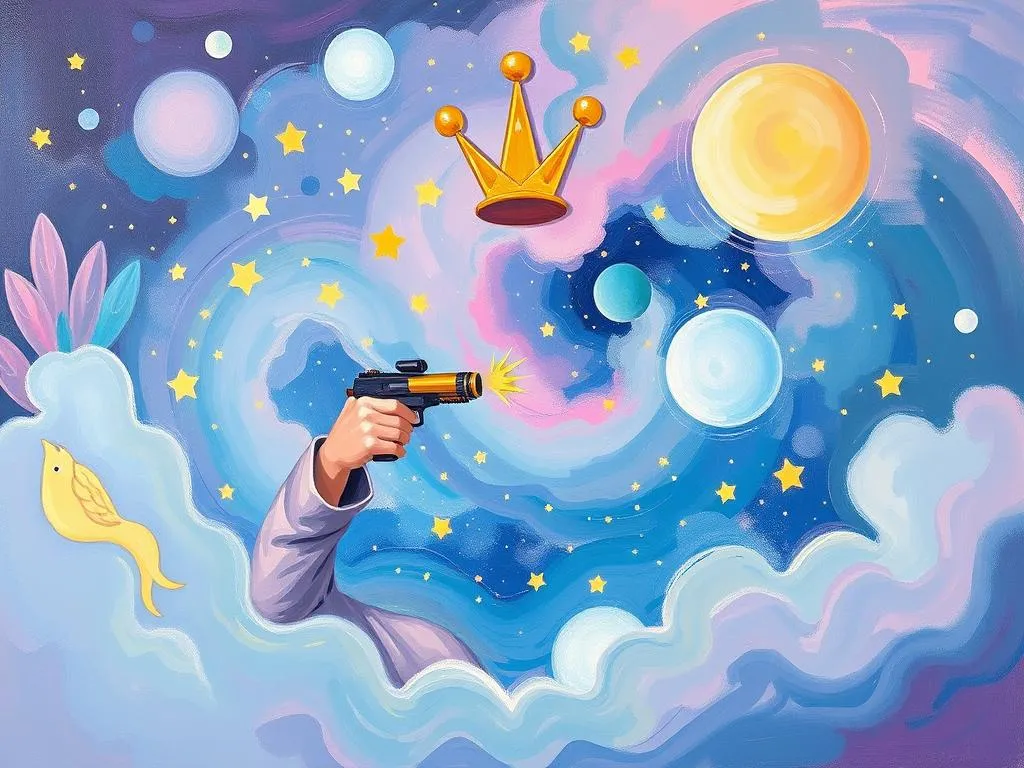
Dreams have always fascinated humanity, serving as a window into the subconscious mind. Among the myriad of dream themes, the haunting imagery of shooting oneself stands out as particularly intense and perplexing. This dream often evokes a potent emotional response, leaving individuals questioning the motives behind such distressing scenarios. The relevance of these dreams lies not only in the shock they induce but also in their potential to uncover deeper issues within ourselves. Understanding the symbolism and meanings behind these dreams can offer valuable insights into our emotional landscape and personal struggles.
Symbolism and Meaning
Dreams that involve shooting yourself can be rich with symbolism and may signify a multitude of internal conflicts. At the core, this dream often reflects feelings of guilt, shame, or self-sabotage. The act of shooting oneself can symbolize an internalized attack on one’s own identity or choices, suggesting a need for self-examination. It may also represent feelings of being overwhelmed and the desire to escape from one’s circumstances.
In many cultures, firearms are associated with power and control. Therefore, dreaming of shooting oneself may indicate a struggle with personal power. This can be linked to feelings of inadequacy or failure, where the dreamer feels they have no control over their life decisions. Additionally, the act of shooting can symbolize a desire to eliminate aspects of oneself that are perceived as negative or harmful. This could be a particular behavior, habit, or even a painful memory that the dreamer wishes to eradicate.
Different perspectives can also affect the interpretation of this dream. For instance, psychologists may view it as a manifestation of repressed anger directed inward. Conversely, spiritual interpretations might suggest that this dream is a call to awaken to one’s true self or to confront unresolved issues. In essence, the dream serves as a mirror, reflecting the inner turmoil that the dreamer may not be consciously addressing.
Key Scenarios and Variations
The context of the dream significantly influences its interpretation. For example, if the dreamer is actively pulling the trigger, it might suggest a more aggressive stance toward self-criticism or a desire to take drastic actions to change one’s life. In contrast, if the dreamer is merely witnessing the act or feeling helpless, it could indicate feelings of being trapped or powerless in a situation, signifying a need for support or intervention in waking life.
Another variation to consider is the presence of others in the dream. If friends or family members are present at the moment of the act, the dream may reflect interpersonal dynamics. This could symbolize feelings of betrayal, the fear of disappointing loved ones, or concerns about how one’s actions affect those around them. Alternatively, if the dreamer is alone, it may highlight a personal battle with self-worth or isolation.
The environment also plays a critical role in the dream’s meaning. A familiar setting, such as the dreamer’s home, may indicate a confrontation with deeply rooted issues connected to their past. Conversely, an unfamiliar or chaotic setting might suggest feelings of instability and uncertainty in the dreamer’s current life.
Furthermore, the emotional response during the dream can provide vital clues. If the dreamer feels relief after the act, it might indicate a desire for liberation from self-imposed constraints. However, feelings of despair or horror could point to an urgent need for self-compassion and healing.
Real-Life Connections and Takeaways
Dreams of shooting oneself can serve as a powerful catalyst for self-reflection. To draw connections between these dreams and real-life situations, individuals are encouraged to engage in introspective practices. Keeping a dream journal can be particularly helpful. By documenting not only the dream but also the emotions and thoughts surrounding it, individuals can begin to identify patterns and recurring themes in their waking lives.
Self-reflection can also be deepened through mindfulness practices. Techniques such as meditation or guided visualization can help individuals explore the feelings associated with these dreams. This allows for a better understanding of any underlying stresses or conflicts that may be manifesting in the dream state.
Moreover, it is essential to consider the context of one’s life when interpreting these dreams. Are there current situations that provoke feelings of inadequacy or self-doubt? Are there unresolved issues that have been pushed aside? Recognizing these triggers can foster personal growth and emotional resilience.
In practical terms, seeking support from friends, family, or mental health professionals can be beneficial when processing these intense emotions. Discussing the dream with someone can provide new perspectives and insights that may aid in understanding the deeper meanings. Additionally, engaging in healthy coping mechanisms, such as exercise, creative expression, or journaling, can help alleviate the stress that may be contributing to these dreams.
Ultimately, dreams of shooting oneself, while distressing, can serve a significant purpose. They challenge us to confront our inner battles and encourage us to take action toward healing and self-acceptance. By delving into the symbolism and meanings of these dreams, we can uncover profound insights that pave the way for personal transformation and emotional clarity.
Embracing the discomfort that comes with such dreams can lead to a richer understanding of oneself and illuminate the path toward growth and healing. Reflecting on these dreams may not only help decipher their meanings but also empower individuals to reclaim their narrative and foster a more compassionate relationship with themselves.







